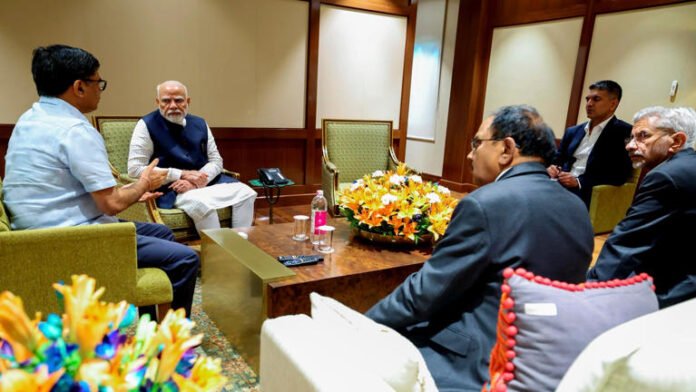A terror attack in Jammu and Kashmir’s Pahalgam region claimed the lives of five Indian Army personnel and left several others injured. The attack, which occurred on Monday, April 22, involved a deadly ambush by suspected terrorists on an Army convoy traveling along the Pahalgam-Anantnag route. In response to the attack, Prime Minister Narendra Modi cut short his scheduled visit to Saudi Arabia and returned to New Delhi, where he chaired a high-level security meeting to assess the situation and review India’s counter-terrorism strategy.
The assault unfolded around midday when the convoy was reportedly moving through the Goriwan area in South Kashmir. Initial reports suggest the terrorists used grenades and automatic weapons, targeting the last vehicle in the convoy with precision. The ambush led to a fierce exchange of gunfire between the militants and the soldiers. Though reinforcements arrived quickly and combing operations were launched, the attackers managed to flee, triggering a massive manhunt in the dense forests surrounding the site.
This is the second major attack on Indian security forces in the Kashmir Valley in recent weeks, raising concerns about a resurgence of cross-border terrorism as the region heads into the general election phase. The timing of the attack has also added to fears that terrorist groups may be trying to destabilize the region and disrupt the democratic process.
Upon his return, PM Modi immediately convened a meeting with top officials, including National Security Advisor Ajit Doval, Defence Minister Rajnath Singh, Home Minister Amit Shah, and the chiefs of the Army, Navy, and Air Force. Sources in the government said that the Prime Minister was “deeply anguished” by the attack and directed the security forces to intensify counter-terror operations in the region.
The meeting, held at the Prime Minister’s residence in New Delhi, focused on intelligence lapses, the preparedness of the forces, and coordination among various security agencies. The Prime Minister emphasized the need for a “proactive approach” in dealing with militant threats and reiterated his commitment to ensuring national security.
In a strongly worded statement following the meeting, Defence Minister Rajnath Singh condemned the attack and expressed condolences to the families of the fallen soldiers. He assured that those responsible would not be spared and that the Indian Army would respond with “full might.” Home Minister Amit Shah echoed similar sentiments, stating that the Centre remains vigilant and committed to rooting out terrorism from Jammu and Kashmir.
Meanwhile, political reactions poured in from across the country. Opposition leaders expressed solidarity with the armed forces and called for a united front in the fight against terrorism. Congress President Mallikarjun Kharge stated, “Terrorism has no place in our society. We stand with our soldiers and their families in this hour of grief.”
Security has been tightened across Jammu and Kashmir in the wake of the attack. Surveillance has been increased at key transit routes, and additional troops have been deployed in sensitive areas. Army officials confirmed that search operations were underway to track down the perpetrators, and several leads had already been developed based on local intelligence.
As the nation mourns the loss of its brave soldiers, the incident has reignited debates about the persistent challenges India faces from terror outfits operating across the border. With general elections underway, the government is expected to bolster its security measures, especially in vulnerable regions like Kashmir.
PM Modi’s decision to prioritize the situation at home by curtailing a critical diplomatic visit underscores the gravity of the current security scenario. As investigations and military operations continue, the focus now lies on preventing further attacks and ensuring that peace prevails in a region long plagued by conflict.

